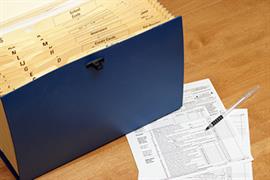Have an Accountable Plan for Expense Reimbursement
When it comes to reimbursing out-of-pocket employee expenditures on work-related items, many employers have established policies. However, if the policy is not created and administered properly, there can be adverse effects for both the employee and the employer.
 By Eric Seidman, CPA
By Eric Seidman, CPA
 Employees may be expected to incur certain out-of-pocket costs as part of their employment responsibilities. This can range from a flight ticket for a meeting to various dues and license fees. Some employers implement policies to reimburse these costs. However, if the policy is not created and administered properly, there are adverse effects for both the employee and employer: the employee would have to pick up the reimbursement as income, and the employer would treat the reimbursement as wages subject to additional payroll taxes.
Employees may be expected to incur certain out-of-pocket costs as part of their employment responsibilities. This can range from a flight ticket for a meeting to various dues and license fees. Some employers implement policies to reimburse these costs. However, if the policy is not created and administered properly, there are adverse effects for both the employee and employer: the employee would have to pick up the reimbursement as income, and the employer would treat the reimbursement as wages subject to additional payroll taxes.
 To avoid the above scenario, the employer will want to create an accountable plan. Under accountable plans, expense reimbursements are not considered income to the employee and are not treated as wages by the employer. Accountable plans have three basic criteria:
To avoid the above scenario, the employer will want to create an accountable plan. Under accountable plans, expense reimbursements are not considered income to the employee and are not treated as wages by the employer. Accountable plans have three basic criteria:
- Expenses are reimbursed if they are connected to the employer’s business.
- Expenses are reimbursed if they are timely substantiated by the employee.
- The employer is returned any excess expense reimbursement to an employee.
An expense is considered connected to the employer’s business when it meets the business deductibility rules of being ordinary and necessary in the trade. Additionally, the expenses have to be incurred in relation to the employee’s service to the employer. While an employee may need pen and paper to perform his or her service, a personal purchase of such supplies would not qualify under an accountable plan.
Expense reimbursement requests are considered substantiated if adequate proof of the expense is submitted to the employer in a timely fashion. This can include copies of receipts, print-outs from bank or credit card statements, mileage logs when travel is involved, and any other supporting document that shows the existence and business purpose of the expense. Employers may opt to use per diem rates in lieu of full substantiation for meals and other incidental expenses.
The return of excess reimbursements comes into play mostly when employers pay for certain costs in advance. For instance, if an employee books a flight and receives a full reimbursement, but the overall cost drops due to the use of airline miles, the employee would be required to return the excess amount that had been reimbursed. If the employer does not get that amount returned, the excess is considered to be from a nonaccountable plan and is subject to treatment as wage income.
Developing an accountable plan and structuring it in a way that holds up to scrutiny is vital, as this is an area the IRS has examined recently. Under audit, if the IRS determines that the reimbursement policy did not meet the basic criteria for an accountable plan, it can retroactively change the tax treatment to that of a nonaccountable plan.
A famous case involved the National Basketball Association in U.S. v. Mathis, 1997. In this case, an NBA referee was entitled to reimbursement for first-class tickets. The reimbursement policy allowed for the referee to downgrade his travel to coach and keep the difference. The difference was included in his W-2 as taxable income, and the employer required referees to submit receipts to account for their travel expenses. The IRS, however, deemed the plan to be nonaccountable, as the employee was allowed to keep the excess amount paid. As a result, the full value of the ticket became income to the employee, and he would have to file Form 2106 for unreimbursed employee business expenses on his tax return.
Businesses, both new and established, should periodically review their expense reimbursement policy to make sure it specifies the criteria. Businesses should also work diligently to ensure the documentation related to employee expense reimbursement would hold up to IRS scrutiny. Even if policies have been functioning for years, a small slipup can yield undesired results for the employer and employee.
Eric Seidman is a manager at Wouch, Maloney & Co. LLP in Horsham, Pa. He is a member of the PICPA’s Image Committee and Greater Philadelphia Chapter Federal Taxation Committee.
PICPA Staff Contributors
Disclaimer
Statements of fact and opinion are the authors’ responsibility alone and do not imply an opinion on the part of PICPA officers or members. The information contained in herein does not constitute accounting, legal, or professional advice. For professional advice, please engage or consult a qualified professional.






